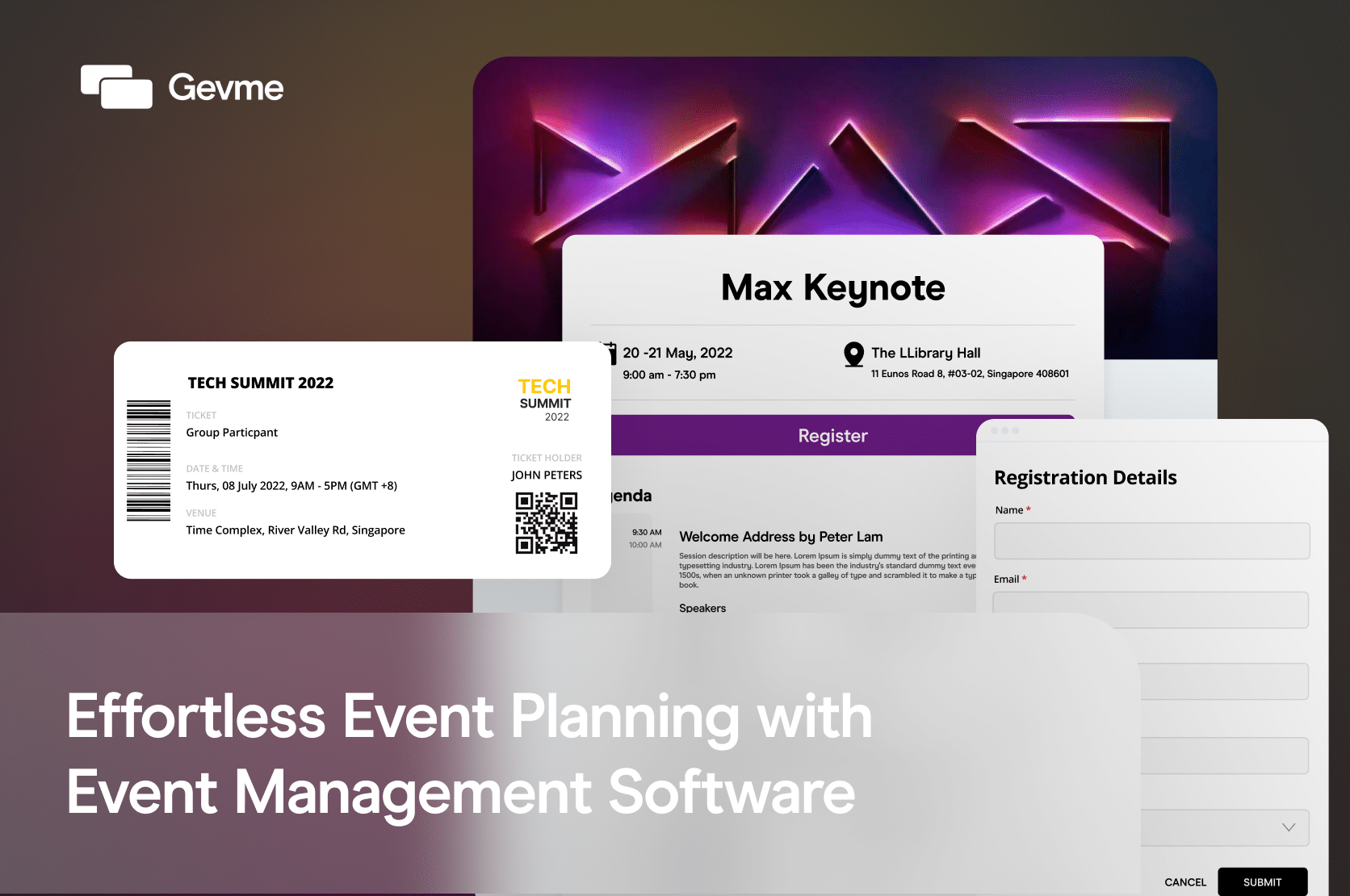In today’s fast-paced world, the realm of event planning and management has been revolutionized by the advent of event management software. This technology streamlines the complex process of organizing events, from small-scale meetings to grand corporate conventions. Event management software serves as an all-encompassing tool, offering solutions for various aspects of event planning, including registration, attendee engagement, and post-event analysis. By automating and simplifying these tasks, this software not only saves time and resources but also enhances the overall efficiency and effectiveness of event management.
The emergence of event management software has been a game-changer in the industry. It allows organizers to manage multiple aspects of their events through a single platform, thus eliminating the need for disparate tools and systems. This integration ensures a smoother, more cohesive planning process, contributing to the success of events in today’s digitally driven world.

Key Features of Event Management Software
Event management software is replete with features designed to streamline and enhance the planning process. Let’s explore the key functionalities that set these platforms apart:
- Registration and Ticketing Systems: One of the core functionalities of event management software is its ability to manage online registrations and ticketing. This feature simplifies the process of signing up attendees, managing ticket sales, and tracking registrations in real time. It often includes customizable registration forms, automated confirmation emails, and secure payment processing, ensuring a seamless experience for both organizers and attendees.
- Event Planning and Scheduling: These platforms provide tools for comprehensive event scheduling, including agenda setting, session management, and speaker coordination. They allow for easy creation and modification of event schedules, helping organizers to keep track of various sessions and activities efficiently.
- Attendee Engagement Tools: Engaging attendees is crucial for the success of any event. Event management software typically includes a range of tools designed to enhance attendee interaction, such as live polling, Q&A sessions, chat functionalities, and networking opportunities. These features facilitate active participation, making events more interactive and enjoyable.
- Analytics and Reporting: The ability to analyze event performance is another significant feature of this software. It offers detailed analytics and reporting tools that provide insights into various aspects like attendee behaviour, engagement levels, and overall event success. This data is invaluable for measuring the impact of the event and planning future strategies.

- Integration and Compatibility: To ensure a cohesive event management process, these platforms often integrate with various other tools and systems such as CRM software, email marketing platforms, and social media. This compatibility enhances the efficiency of the event planning process, allowing for a more streamlined and unified approach.
Analysis of Pricing Models
Event management software comes with diverse pricing models, catering to a range of budgetary and operational needs. Understanding these models is crucial for selecting software that aligns with your event’s financial framework.
- Subscription vs. One-time Payment: The most common pricing model is a subscription-based approach, where users pay a recurring fee, often monthly or annually. This model typically offers continuous updates and support, making it suitable for organizations that regularly host events. Conversely, some software provides a one-time payment option, appealing to those looking for a long-term solution without recurring costs.
- Free vs. Paid Options: Many event management platforms offer basic functionalities for free, which can be a great starting point for small-scale or less complex events. However, these free versions might have limitations in features and scalability. Paid versions, on the other hand, unlock a full suite of tools and capabilities, suitable for larger, more intricate events requiring advanced functionalities.
- Custom Pricing for Large-scale Events: For large-scale or highly complex events, some software providers offer custom pricing. This model is tailored to the specific needs of the event, taking into account factors like the size of the attendee base, the complexity of the event, and any special features or integrations required. Custom pricing ensures that large event organizers don’t pay for unnecessary features while getting all the specialized tools they need.

Different Types of Event Management Software
Event management software varies widely, catering to diverse event planning needs. Here’s a breakdown of the different types available:
- All-in-One Solutions: These comprehensive platforms offer end-to-end management tools covering every aspect of event planning and execution. Ideal for large-scale and multifaceted events, they provide functionalities like registration, attendee tracking, event marketing, and post-event analysis under one roof.
- Specialized Software: Some software focuses on specific aspects of event management. For example, certain platforms may specialize in ticketing and registration, while others may offer robust attendee engagement tools. These specialized solutions are perfect for events with specific needs or when used in conjunction with other event management tools.
- Industry-Specific Software: There are also software solutions tailored to specific industries. For instance, a corporate event might require different features compared to a music festival or a charity fundraiser. Industry-specific software is designed with these unique requirements in mind, providing targeted solutions that cater to the specific dynamics and expectations of different event types.
Benefits of Using Event Management Software
The utilization of event management software offers a multitude of benefits, transforming the way events are planned and executed:
- Efficiency and Time Saving: The most significant advantage is the remarkable efficiency and time-saving capabilities. Automating various tasks such as attendee registration, ticketing, and scheduling reduces manual workload, thereby accelerating the event planning process. This efficiency allows event organizers to focus on more strategic aspects like content creation, marketing strategies, and enhancing overall event quality.
- Improved Attendee Experience: These platforms significantly elevate the attendee experience. Customizable registration processes, interactive agenda-setting, real-time communication tools, and seamless check-in processes contribute to a smooth and enjoyable attendee journey. Features like live polling, Q&A sessions, and virtual networking spaces actively engage attendees, making events more interactive and memorable.
- Scalability and Flexibility: Event management software is highly scalable, making it suitable for events of all sizes. It can easily adapt to various requirements, from intimate workshops to large-scale international conferences. This flexibility ensures that as the event grows in size or complexity, the software can adjust accordingly, accommodating a larger attendee base, more complex scheduling, and increased data management needs.
- Data-Driven Insights and Analytics: Advanced analytics and reporting features enable organizers to gain critical insights into various aspects of the event. This includes attendee behaviour, session popularity, ticket sales, and overall engagement levels. These insights are crucial for measuring the success of the event and for making data-driven decisions for future improvements. Analyzing this data helps in understanding what works best for the audience and how to optimize future events for better engagement and return on investment.
- Enhanced Marketing and Promotion: Event management software often includes tools for effective event marketing and promotion. This can range from email marketing integrations, and social media management, to targeted advertising tools. These features assist in reaching a broader audience, creating compelling marketing campaigns, and tracking the effectiveness of promotional activities.
- Cost-Effectiveness: Despite the upfront investment, using event management software can be cost-effective in the long run. It reduces the need for physical materials, minimizes the likelihood of errors (which can be costly), and lowers the requirement for extensive manpower to manage event-related tasks.
- Environmental Sustainability: By facilitating digital registrations, e-tickets, and online event materials, such software contributes to environmental sustainability. Reducing the reliance on physical materials not only cuts costs but also aligns with eco-friendly practices.
Considerations When Choosing Event Management Software
Selecting the right event management software involves aligning your event’s needs with the software’s features, usability, and budget. Let’s examine these critical factors:
- Identifying Your Needs: Begin by conducting a thorough assessment of your event’s specific requirements. Consider the scale of your event, target audience demographics, desired levels of interactivity, content complexity, and any unique features you might need. For instance, does your event require a sophisticated ticketing system, interactive booths for a virtual fair, or perhaps intricate scheduling for multiple tracks in a conference? Understanding these nuances will ensure you choose software that meets your specific demands.
- Evaluating Software Capabilities: Dive deep into the functionalities offered by different software. Look for key features like attendee management, event marketing tools, real-time data analytics, and customizable registration processes. Assess whether these tools are just necessities or if they offer advanced capabilities. For example, does the software provide detailed insights into attendee behaviour or sophisticated marketing automation tools? Ensure the chosen software can handle your event’s scale and complexity while offering efficient management and engagement solutions.
- User Experience and Support: A critical aspect is the user experience – the software should offer a seamless and intuitive interface for both organizers and attendees. A complex or non-intuitive platform can lead to user frustration and decreased engagement. Additionally, evaluate the level of customer support and training provided. Strong customer support, including responsive technical assistance and training resources, is vital for addressing any challenges and ensuring the smooth functioning of your event.
- Integration with Existing Systems: It’s important to check the software’s compatibility with other tools you’re already using. Integration capabilities with CRM systems, email marketing tools, social media platforms, and payment processing systems are essential for a streamlined workflow. This integration facilitates data synchronization, reduces manual data entry, and enhances overall operational efficiency.
- Security and Compliance: In today’s digital age, data security and privacy compliance are paramount. Ensure that the software complies with global data protection regulations like GDPR and offers robust security features to safeguard sensitive attendee information. This is crucial not only for protecting data but also for maintaining the trust and confidence of your attendees.
- Budget Considerations: Align your software choice with your budget constraints. Consider both immediate and long-term costs, including subscriptions, one-time purchases, and any additional charges for premium features or increased attendee capacity. It’s also prudent to consider the ROI that the software will bring in terms of time savings, enhanced attendee experience, and improved event outcomes.
- Scalability and Flexibility: The chosen software should be scalable and flexible to adapt to your evolving event needs. As your events grow in size or complexity, the software should be able to scale up accordingly, offering additional features and capabilities as needed.
- Trial and Demos: Before making a final decision, take advantage of free trials or demos offered by the software providers. This hands-on experience will give you a better understanding of the software’s functionality and its fit with your event needs.
Gevme: An Advanced Event Management Software
Gevme offers a comprehensive suite of tools that exemplify the capabilities of modern event management solutions. It exemplifies many of the features and benefits we’ve discussed:
- Comprehensive Feature Set: Gevme excels with an all-in-one approach, offering tools for online registration, email marketing, website building, on-site management, and attendee engagement. Its capability to handle diverse tasks from start to finish makes it stand out in the realm of event management software.
- Customizable and Scalable Solutions: Gevme caters to events of all sizes, from small workshops to large-scale international conferences. Its platform is highly customizable, allowing event planners to tailor the look and feel of their event, aligning with specific branding and thematic needs.
- Robust Analytics and Data Insights: Gevme provides detailed analytics, offering valuable insights into attendee behaviour and event performance. This feature is crucial for understanding the impact of your event and strategizing for future improvements.
- User-Friendly Design and Dedicated Support: Emphasizing ease of use, Gevme’s interface is designed for intuitive navigation, ensuring a smooth experience for both organizers and attendees. They also offer dedicated customer support and resources, aiding users in leveraging the platform effectively.
- Innovative Engagement Tools: The platform includes advanced engagement tools like networking solutions, interactive sessions, and live engagement analytics, enhancing the overall attendee experience and engagement.
Conclusion
Event management software has become an indispensable tool in the arsenal of modern event planners. It streamlines various aspects of event planning, offers valuable insights through analytics, and significantly enhances attendee engagement. The key to leveraging these benefits lies in choosing software that aligns with your event’s specific needs, from its feature set and usability to integration capabilities and pricing structure. Platforms like Gevme demonstrate how versatile and effective these tools can be, providing comprehensive solutions that cater to a wide range of events. Ultimately, the right event management software can transform the complexities of event planning into a manageable, efficient, and enjoyable process.








